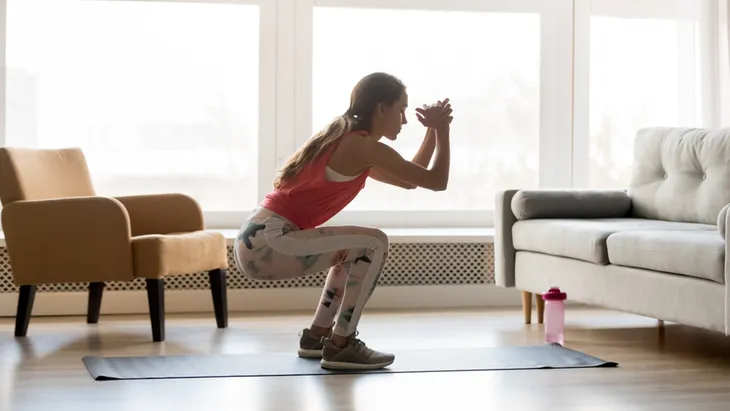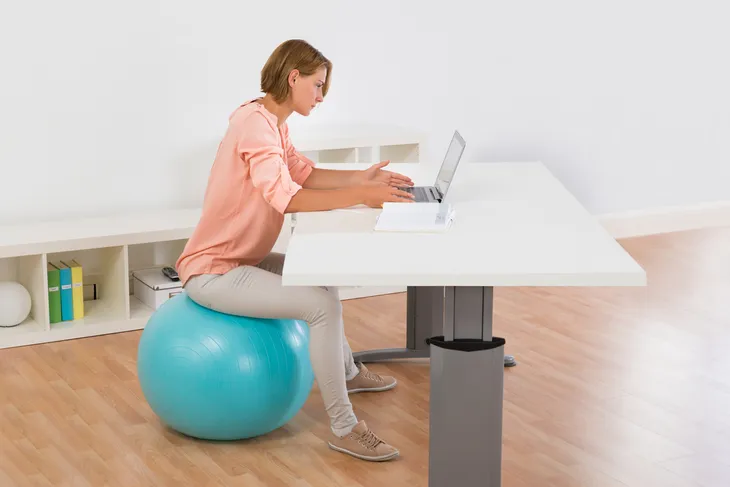Working from home has become quite the trend. More and more businesses are offering work from home positions, and technology has allowed more jobs to be done remotely. But working from home doesn’t mean you get to slack off, in many cases, employees who work remotely are actually more productive and work more than those in an office environment. The benefits of no commute and flexible hours make it seem like an ideal situation, but it can be difficult to maintain a healthy lifestyle.
If you don’t consciously make an effort to be healthy, working from home can decrease your physical activity; cause back, shoulder and neck problems; result in longer hours; and have a negative impact on your overall health. With these 10 healthy work from home tips, you can reap the benefits of your situation without the damage…
1. Set and Keep Regular Hours
It’s easy to be connected to work all the time when you work from home. Without set start and stop times, you can end up working in the evening and on weekends. It’s unhealthy to always be connected through your phone or even going to your home office to answer emails outside of regular business hours. Unless it’s a job requirement to be on call, unplugging at the end of a regular work day can help reduce stress and improve your overall health–your mind needs breaks, and time free to spend with your family or taking some much-needed me time will make a noticeable difference in your life.
2. Have a Designated Office or Workspace
It might seem like a dream come true to work on your couch or even in bed, but not having a designated workspace can be harmful to both your physical and mental health. Comfy sofas and bed pillows don’t offer the necessary support for your back, which can lead to poor posture and back, shoulder and neck pain. By setting up a home office or a workspace that’s away from the area of your house that you use frequently outside of work, you’ll properly divide your home and work life. You also need to have good support and posture, so invest in an office chair that will give you the physical support you need.
3. Take Hourly Breaks
Studies have shown that workers who take hourly breaks are more productive, so not only will taking hourly breaks likely increase your productivity, it’s also good for your health. Sitting all day without getting up and taking a walk around can negatively impact your heart health and decrease your metabolism. To remind yourself to take these hourly breaks, set a timer on your watch, computer or phone. Use these reminders until it becomes second nature to you to take these breaks–it can be just the motivation you need to maintain a healthy lifestyle when working from home.
4. Make Your Space Ergonomic
Some of the most common physical problems people experience working at a desk every day is neck, shoulder and back pain. Sitting and staring at a computer monitor all day long is bound to cause problems, both in the short and long-term. In order to have an ideal work area for better health when you work from home, make your space ergonomic. According to the Mayo Clinic, there are several factors that make a space ergonomic: proper chair height and support, keeping key objects close to you, mouse position, wrist position, monitor height, desk dimension, headsets, footrests, wrist rests, and posture. Follow the recommended ergonomic set up for prevent related health issues.
5. Fit in Some Exercise
During a lunch break, you have time to get up from your desk and go for a walk or do some other form of exercise. Although you might not normally work out during the day if you were in an office, not being in an office will really decrease the amount of steps you take. It might not seem like you walk a lot when at an office but trips to the cafeteria or lunch room, or even having to walk to a bathroom on the other side of the building adds up. When your bathroom and kitchen are so close, you’re not moving nearly as much, so getting away from your monitor to exercise will burn calories and give your brain a rest.
6. Sit on an Exercise Ball
You’ve probably seen or at least heard of people who use an exercise / stability ball as their desk chair. Exercise balls are great for building core strength and can help with your posture, as long as you use them properly. A regular desk chair doesn’t require muscle activity, whereas a stability ball requires the muscles in your core, hips and legs to contract in order to balance. Using a ball on and off throughout the day can greatly improve your core strength and muscle tone. Just make sure you’re conscious of good posture, have the right size of ball for your height, and move to a regular chair if you experience lower back pain.
7. Get Out of the House
There are a lot of physical health problems caused by working from home, but it’s important to remember to take care of your mental health as well. Working by yourself from home makes you really isolated–you don’t have colleagues to chat with over coffee and lunch breaks are taken on your own. All of this isolation isn’t good for your mental health, so getting out of the house regularly is important. Head to a coffee shop with wifi to be around people or go to networking events to experience face-to-face social interaction. It can get pretty lonely being by yourself all the time, even though you might not realize it.
8. Stand When You Can
There are a lot of ways you can incorporate standing into your work day. If possible, get a standing desk or a desk that can be adjusted to both chair and standing height. Standing desks may reduce the chance of obesity, cancer and cardiovascular disease. Just be aware that they can take a while to get used to, and make sure you have proper footwear on when you use it. Another way to stand and even get some walking in is when you’re on a call. Pace around the floor your office is on, there’s nothing wrong with walking around while on the phone, and doing so will increase your daily steps and keep your metabolism up.
9. Take a Regular Lunch
Having a kitchen close to you at all times can lead to unhealthy snacking. It can also go the other way–a lot of people completely skip lunch when they work from home. But you need a healthy, regular meal at lunch to give you energy and bring your blood sugar levels back up. A mid-day meal helps you concentrate and focus on work for the rest of your day. If you typically work through lunch when you work from home, by the time you end up in the kitchen you’ll feel starving and are likely to binge eat, which is unhealthy and can contribute to weight gain.
10. Keep Healthy Foods Stocked
It’s so easy to go to your kitchen and snack on all of the unhealthy foods you buy for special occasions or when guests come over. Snacking constantly is already a common temptation when you work from home because your kitchen is easily accessible–why make regular snacks and lunches when you can walk to the kitchen whenever you want? But doing this will likely lead to snacking on junk food. To avoid unhealthy snacks, keep healthy snacks readily available. You could even make a full lunch, including snacks, and keep it all together in your fridge. That way you know how much food you eat and ensures you’re snacking on healthy stuff.













